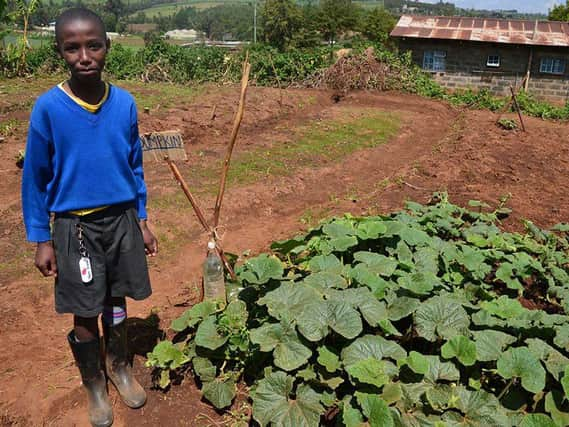Slow Food movement celebrates traditional methods of production


Today is Terra Madre Day and across the globe communities will embrace local eating, agricultural diversity and sustainable food production to celebrate the earth.
One of the inspiring things that Slow Food is responsible for is the “10,000 Gardens in Africa” project.
Advertisement
Advertisement
Kevin Muraya is a 12 year old who lives in Elburgon in Kenya. He attends the Michinda School in the town.
Kevin explained: “We are 50 children and we take turns doing a thousand different things: we sow, we water the plants,we pick the vegetables. We’ve also learned how to produce our own seeds and compost. And we have lots of fun with the animals. We raise rabbits, chickens, sheep, turkeys and geese. We grow a bit of everything: cassava, spinach, carrot, sorghum, pumpkins, amaranth and bananas, too.
“When we harvest the fruit and vegetables we all cook together in the school canteen, and if something is left over we have a little market and use the money to buy many things such as watering cans, wheelbarrows, notebooks.
“At the start my parents weren’t happy because in Kenya working in the garden is seen as a punishment for badly behaved pupils, but then they realised that we’re doing something important. When I grow up I want to be a farmer and produce my own food.”
Advertisement
Advertisement
Slow Food has so far created 2,500 gardens, like this one, across Africa in over 30 countries. The aim is to reach 10000 gardens in schools, communities and hospitals.
If you’d like to donate or perhaps give a donation on someone’s behalf instead of a gift go to donate.slowfood.com It costs 900 euro to set up and maintain a garden - a small amount of money in comparison to the good that it does.
We’re blessed in Northern Ireland to have ethical farmers, growers and producers who are passionate about what they do.
At the Broighter Gold rapeseed oil pop up shop last weekend, Alaistair Crown was there with one of his saddleback sows and three of her piglets. It was so refreshing to see youngsters getting really excited about engaging with real animals, and not on some app, on this working farm. Alaistair produces chorizo sausage and salami from the meat under his Corndale Farm brand. It’s a product that will add zing to a myriad of dishes.
Advertisement
Advertisement
I did a cooking demonstration in Broighter Gold’s new shed, at the pop up, and cooked a barley salad with Alastair’s chorizo and some local beetroot. The sausage exudes an oil that a virtue should be made of and it was used as a dressing base for the whole dish. Barley and beef have always been the crux of our broth here and it’s a combination that works. The first recipe this week is for toasted barley with beetroot, chorizo and some grilled beef.
I’ve always said if something isn’t improved with the addition of cured pork and butter then it’s a lost cause. Despite having a deep love for bitter greens, cabbage and broccoli my heart does not lie to the sprout.
But undeterred my second recipe is for these festive mini vegetables with bacon and chestnuts (check out eurosparni.com for other seasonal recipes and videos) - the crispy bacon and warm nuts add flavour and texture to these funny little orbs - just my opinion!
Another great advocate for Slow Food is Susie Hamilton-Stubber from Richhill who produces Burren Balsamics. She captures the essence of the seasons and suspends them in good Italian vinegar. You can taste summer in her strawberry and mint and rhubarb and ginger infusions. Late Autumn is arrested in a blackberry and thyme liquor. She has caught the magic of the season in her cranberry and orange Christmas vinegar.
My last recipe this week is for chocolate truffles laced with this vinegar, a touch of spice and port - the perfect end to any meal.